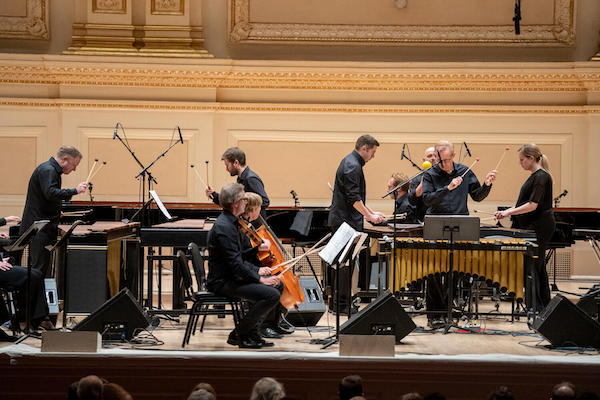Mix issues apart, Steve Reich’s music is celebrated in high style at Carnegie

Fifty years ago, Steve Reich was only writing music for his own ensemble in a shorthand method that he and his musicians understood. He was furthering classical music by leaps and bounds, but his work was not part of the repertoire.
What a difference a half-century can make. Now, and for decades, Reich’s earlier works have been transcribed and adopted by groups around the world, and he has made music for other small groups, soloists, and orchestras. That legacy, old and new, was onstage Tuesday night at Carnegie Hall for “A Steve Reich Celebration,” with the Colin Currie Group and Synergy Vocals playing Reich’s recent Traveler’s Prayer and two of his greatest earlier pieces, Tehillim and Music for 18 Musicians.
There were two problems: Currie’s uneven conducting and the sound mix in the hall. The energy and musicality of the playing and the brilliance of the pieces overcame both issues, culminating in an evening of music that felt like it was bursting inside the listener.
Currie is a percussionist, and conducted in the first half and played in the ensemble for Music for 18 Musicians in the second. In Tehillim and Traveler’s Prayer he kept a clear, steady beat throughout. Tehillim is a setting of Hebrew Psalms for vocal group and chamber orchestra, a driving, soaring four-movement piece that develops thrilling dramatic force and satisfaction. But the playing suffered in the sections where there was minimal percussion, like the central stretch in Part I of the former work. The tempo slows slightly, and most of the percussion drops away, but Reich’s forward-pushing syncopations are still there. Yet Currie didn’t shape the accents or deliver the impetus the music needed, and here the performance fell flat.
The opening of Part III was also a little sluggish, exacerbated by the audience, which burst into hoots and applause after the end of Part II, some already standing, while Currie nodded thanks and waited for some calm to complete the rest of the piece. This used up energy that needed replacing, and led to confusion in many patrons, who wandered out of the hall during the stage change for Traveler’s Prayer, thinking they had already heard the new piece and that is was intermission.
The other, more serious problem, was the poor sound mix. Reich’s music uses amplification, something so common on the contemporary scene that it should never be an issue.
But the mix in Tehillim was clotted and askew, with the vocalists burying the clarinets in a sonic field that was weirdly separated from the strings, sounding like the instrumental sections were playing in different rooms. Many of the accents, especially in the strings, were dulled by the amplification. In Music for 18 Musicians, the timbres of the bass clarinets and the xylophones were harsh and unpleasant.
Again, the overall playing triumphed over both of these. Tehillim rebuilt a moment of joyous energy, enough to sustain the long staging change for Traveler’s Prayer.
Co-commissioned by Carnegie, this was the American premiere of this work, a setting for voices, strings, vibraphones and pianos of three short excerpts from Exodus, Genesis, and Psalm 121. In Reich’s current style, this was a winding, sinuous piece, lovely and with an aesthetic that reached back to Renaissance polyphony.
Counterpoint has been fundamental to the composer’s work for decades, and Traveler’s Prayer reflects that essential element. Made with what the composer said in the program notes are free canons, contrapuntal phases coordinated on different pulses, this was an ingenious and beguiling mix of Reich’s diamond-cut phrases but with a softer feeling, extended lines mixing with shorter ones in basic canonic structures like retrograde and inversion. It was like hearing Dufay but in Reich’s unique, slender scoring.
Music for 18 Musicians is always a great live event. Along with the sound, it is at thrill to see the musicians working together on stage, without a conductor, the percussionists spelling each other on the extended repetitions, the vibraphonist, in the center, cuing section changes with short phases. With the musicians in Reich’s prescribed stage layout, one didn’t just hear the music, but saw how it all worked, an important and meaningful visual representation of the composer’s concept of music as a gradual process.
This was a fantastic experience Tuesday night. The musicians played with both bite and lightness in all the phrasing, the constant eighth-note patterns in the marimbas swinging. The pulses came off the page, through the musicians bodies, and out into the audience. One felt the ensemble move from the cruising feeling of parts like Section IV—that are placed in a higher range—downshifting into the surging feeling of Section VI and beyond. Music for 18 Musicians is a masterpiece of the repertoire, and as long as musicians have the skill and stamina to play it, performances like this one will always be nothing short of tremendous.
Flutist Claire Chase leads a celebration of Pauline Oliveros, 9 p.m. January 21, 2023. carnegiehall.org.
Posted Nov 03, 2022 at 4:48 am by Richard S H
Did we attend the same concert? I thought this was the best and most rhythmically exacting performance of Tehillim I’ve heard (and this was my 6th or 7th Tehillim). Currie was rock solid in his conducting.
Posted Nov 08, 2022 at 1:22 pm by Heather
Some readers might find it interesting to know that the composer was very much in charge of the amplification during the entire four hour rehearsal and performance. It was how he wanted the sound to be.